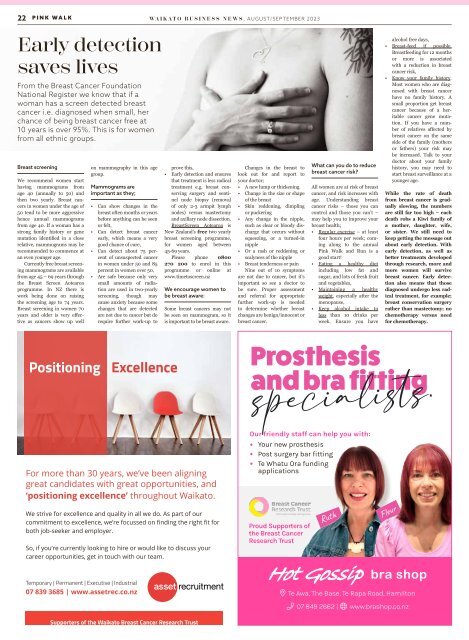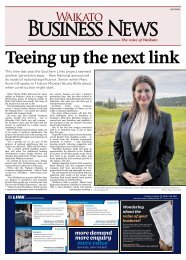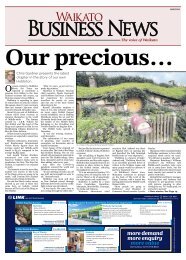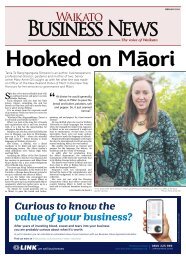Waikato Business News August/September 2023
Waikato Business News has for a quarter of a century been the voice of the region’s business community, a business community with a very real commitment to innovation and an ethos of cooperation.
Waikato Business News has for a quarter of a century been the voice of the region’s business community, a business community with a very real commitment to innovation and an ethos of cooperation.
- No tags were found...
Create successful ePaper yourself
Turn your PDF publications into a flip-book with our unique Google optimized e-Paper software.
22 PINK WALK<br />
WAIKATO BUSINESS NEWS, AUGUST/SEPTEMBER <strong>2023</strong><br />
Early detection<br />
saves lives<br />
From the Breast Cancer Foundation<br />
National Register we know that if a<br />
woman has a screen detected breast<br />
cancer i.e. diagnosed when small, her<br />
chance of being breast cancer free at<br />
10 years is over 95%. This is for women<br />
from all ethnic groups.<br />
Breast screening<br />
We recommend women start<br />
having mammograms from<br />
age 40 (annually to 50) and<br />
then two yearly. Breast cancers<br />
in women under the age of<br />
50 tend to be more aggressive<br />
hence annual mammograms<br />
from age 40. If a woman has a<br />
strong family history or gene<br />
mutation identified in a close<br />
relative, mammograms may be<br />
recommended to commence at<br />
an even younger age.<br />
Currently free breast screening<br />
mammograms are available<br />
from age 45 – 69 years through<br />
the Breast Screen Aotearoa<br />
programme. In NZ there is<br />
work being done on raising<br />
the screening age to 74 years.<br />
Breast screening in women 70<br />
years and older is very effective<br />
as cancers show up well<br />
on mammography in this age<br />
group.<br />
Mammograms are<br />
important as they;<br />
• Can show changes in the<br />
breast often months or years<br />
before anything can be seen<br />
or felt,<br />
• Can detect breast cancer<br />
early, which means a very<br />
good chance of cure,<br />
• Can detect about 75 percent<br />
of unsuspected cancer<br />
in women under 50 and 85<br />
percent in women over 50,<br />
• Are safe because only very<br />
small amounts of radiation<br />
are used in two-yearly<br />
screening, though may<br />
cause anxiety because some<br />
changes that are detected<br />
are not due to cancer but do<br />
require further work-up to<br />
prove this,<br />
• Early detection and ensures<br />
that treatment is less radical<br />
treatment e.g. breast conserving<br />
surgery and sentinel<br />
node biopsy (removal<br />
of only 2-3 armpit lymph<br />
nodes) versus mastectomy<br />
and axillary node dissection.<br />
BreastScreen Aotearoa is<br />
New Zealand's free two yearly<br />
breast screening programme,<br />
for women aged between<br />
45-69 years.<br />
Please phone 0800<br />
270 200 to enrol in this<br />
programme or online at<br />
www.timetoscreen.nz<br />
We encourage women to<br />
be breast aware:<br />
Some breast cancers may not<br />
be seen on mammogram, so it<br />
is important to be breast aware.<br />
Changes in the breast to<br />
look out for and report to<br />
your doctor;<br />
• A new lump or thickening<br />
• Change in the size or shape<br />
of the breast<br />
• Skin reddening, dimpling<br />
or puckering<br />
• Any change in the nipple,<br />
such as clear or bloody discharge<br />
that occurs without<br />
squeezing, or a turned-in<br />
nipple<br />
• Or a rash or reddening or<br />
scalyness of the nipple<br />
• Breast tenderness or pain<br />
Nine out of 10 symptoms<br />
are not due to cancer, but it’s<br />
important so see a doctor to<br />
be sure. Proper assessment<br />
and referral for appropriate<br />
further work-up is needed<br />
to determine whether breast<br />
changes are benign/innocent or<br />
breast cancer.<br />
What can you do to reduce<br />
breast cancer risk?<br />
All women are at risk of breast<br />
cancer, and risk increases with<br />
age. Understanding breast<br />
cancer risks – those you can<br />
control and those you can’t –<br />
may help you to improve your<br />
breast health;<br />
• Regular exercise – at least<br />
four hours per week; coming<br />
along to the annual<br />
Pink Walk and Run is a<br />
good start!<br />
• Eating a healthy diet<br />
including low fat and<br />
sugar, and lots of fresh fruit<br />
and vegetables,<br />
• Maintaining a healthy<br />
weight, especially after the<br />
menopause,<br />
• Keep alcohol intake to<br />
less than 10 drinks per<br />
week. Ensure you have<br />
alcohol free days,<br />
• Breast-feed if possible.<br />
Breastfeeding for 12 months<br />
or more is associated<br />
with a reduction in breast<br />
cancer risk,<br />
• Know your family history.<br />
Most women who are diagnosed<br />
with breast cancer<br />
have no family history. A<br />
small proportion get breast<br />
cancer because of a heritable<br />
cancer gene mutation.<br />
If you have a number<br />
of relatives affected by<br />
breast cancer on the same<br />
side of the family (mothers<br />
or fathers) your risk may<br />
be increased. Talk to your<br />
doctor about your family<br />
history, you may need to<br />
start breast surveillance at a<br />
younger age.<br />
While the rate of death<br />
from breast cancer is gradually<br />
slowing, the numbers<br />
are still far too high – each<br />
death robs a Kiwi family of<br />
a mother, daughter, wife,<br />
or sister. We still need to<br />
keep getting the message out<br />
about early detection. With<br />
early detection, as well as<br />
better treatments developed<br />
through research, more and<br />
more women will survive<br />
breast cancer. Early detection<br />
also means that those<br />
diagnosed undergo less radical<br />
treatment, for example;<br />
breast conservation surgery<br />
rather than mastectomy; no<br />
chemotherapy versus need<br />
for chemotherapy.<br />
Positioning<br />
Excellence<br />
Prosthesis<br />
and bra fitting<br />
specialists.<br />
For more than 30 years, we’ve been aligning<br />
great candidates with great opportunities, and<br />
‘positioning excellence’ throughout <strong>Waikato</strong>.<br />
We strive for excellence and quality in all we do. As part of our<br />
commitment to excellence, we’re focussed on finding the right fit for<br />
both job-seeker and employer.<br />
So, if you’re currently looking to hire or would like to discuss your<br />
career opportunities, get in touch with our team.<br />
Our friendly staff can help you with:<br />
• Your new prosthesis<br />
• Post surgery bar fitting<br />
• Te Whatu Ora funding<br />
• applications<br />
Proud Supporters of<br />
the Breast Cancer<br />
Research Trust<br />
Ruth<br />
Fleur<br />
Temporary | Permanent | Executive | Industrial<br />
07 839 3685 | www.assetrec.co.nz<br />
Te Awa, The Base, Te Rapa Road, Hamilton<br />
phone 07 849 2662 | globe www.brashop.co.nz<br />
Supporters of the <strong>Waikato</strong> Breast Cancer Research Trust

















